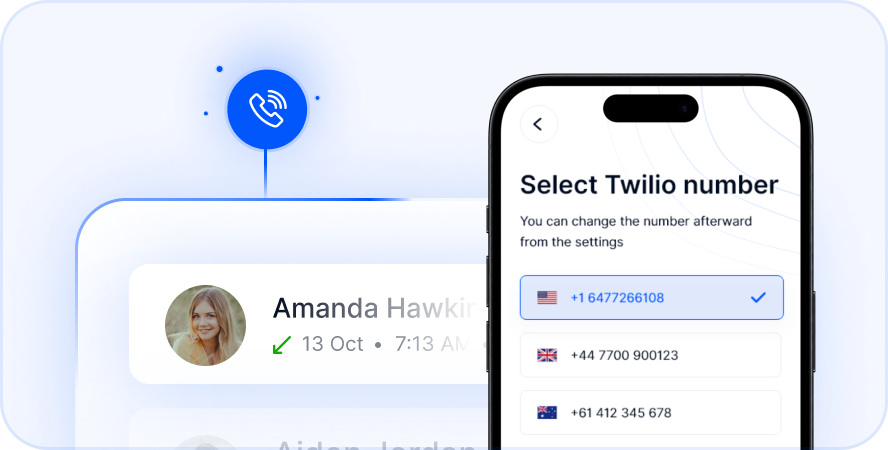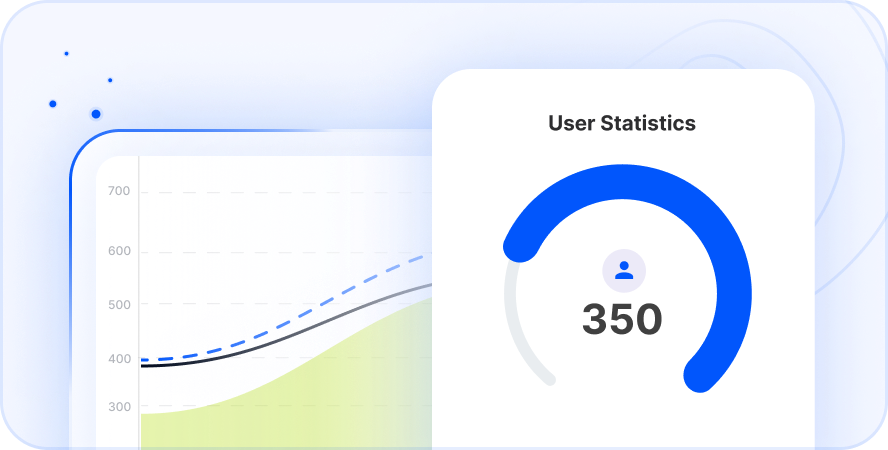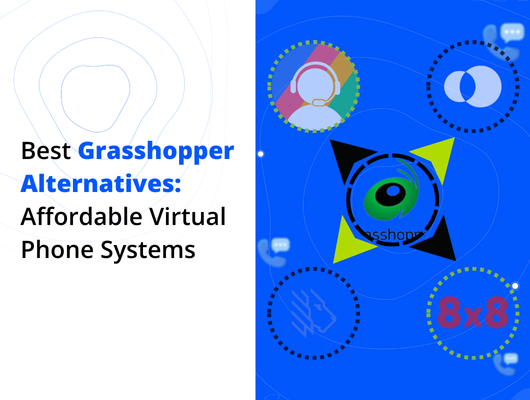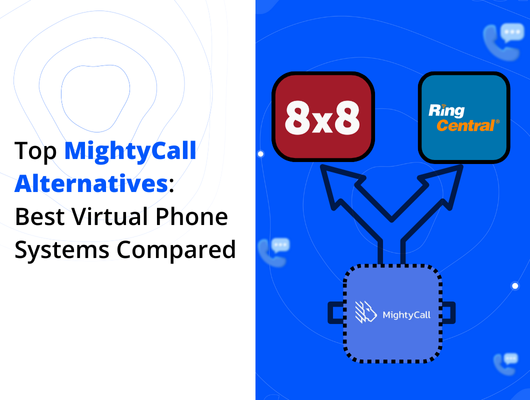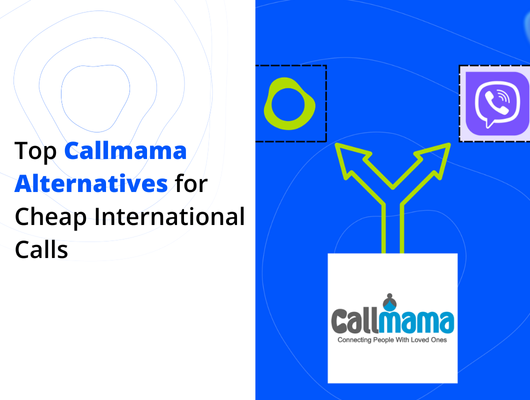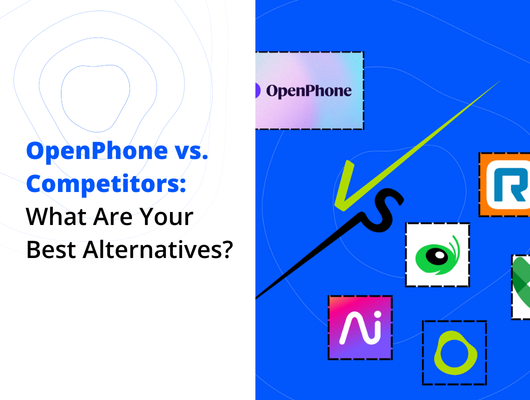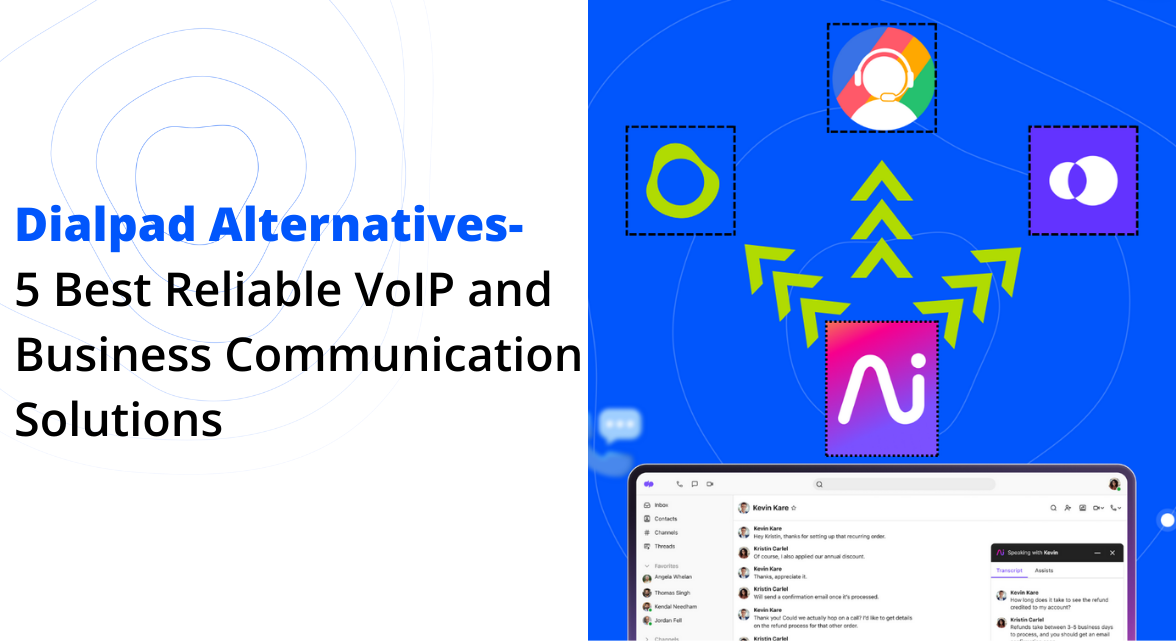
Effective business communication is crucial for staying competitive in today’s fast-paced world. Many companies rely on Voice over Internet Protocol (VoIP) systems to handle their calls, messages, and team collaboration. Dialpad is a well-known name in this field, offering a range of features for modern businesses. However, every business has unique needs. What works perfectly for one company might not be the ideal fit for another. This leads many to explore Dialpad alternatives and other options beyond the most popular platforms. Understanding the landscape of available tools is key to making the best decision for your team. According to Statista, the global VoIP market size was valued at billions of U.S. dollars in recent years and is projected to continue growing, showing the widespread adoption of these technologies.
Exploring alternatives to Dialpad can help you find a system that aligns better with your specific operational requirements, budget constraints, or desired feature sets. Whether you need more specialized integrations, different pricing structures, or enhanced customization options, there are many reliable VoIP and business communication solutions available. This guide will walk you through five top alternatives, highlighting their strengths and helping you compare them to find the perfect match for your business growth.
Why Consider Dialpad Alternatives?
While Dialpad is a powerful platform, several factors might lead businesses to look for different solutions. Sometimes, pricing plans may not fit the budget of a small or growing company. Other times, a business might require very specific features or integrations that Dialpad doesn’t offer natively or as cost-effectively.
Scalability is another important consideration. Some businesses need a system that can be easily customized or adjusted as they expand, perhaps adding specific country numbers or integrating with niche software. Furthermore, different industries or business models may benefit more from certain features, such as extensive international calling capabilities, advanced analytics, or unique messaging options like integrated WhatsApp. Evaluating alternatives ensures you don’t settle for a system that is merely “good enough” but find one that truly accelerates your communication efficiency.
1. Telfon: Flexible, Affordable, and Feature-Rich
Telfon stands out as a compelling Dialpad alternative, especially for businesses prioritizing cost-effectiveness alongside extensive features and customization. It provides a robust virtual phone system that is designed to be accessible for startups and scalable for larger companies. This platform makes international communication simple and affordable, supporting calls and SMS across numerous countries.
Telfon offers key functionalities like voicemail, call recording, and even WhatsApp integration, a feature not commonly found in many standard VoIP systems. Businesses looking for multi-number support, bulk messaging, or seamless integration with popular CRM and sales tools like Salesforce and HubSpot will find Telfon particularly useful. Its appeal lies in its ability to adapt to diverse business communication workflows, whether you’re focused on B2B outreach or B2C customer service.
Key Features:
- International calls and SMS to over 180 countries.
- Advanced analytics, user management, and custom messaging for business plans.
- Virtual number purchase options globally.
- Call recordings, voicemail, and voicemail-to-text.
- Integrated WhatsApp with multi-account support.
- Multi-country number management simultaneously.
- Bulk SMS and message broadcasting.
- Customizable business solutions (B2B & B2C).
- Integration with CRM and sales tools like Salesforce and HubSpot.

2. RingCentral: The All-in-One Powerhouse
RingCentral is a widely recognized business communication platform offering a comprehensive suite of services. It combines VoIP phone services, video conferencing, and team messaging into a single, unified application. This makes it an excellent choice for businesses seeking to consolidate their communication tools.
The platform is known for its reliability and extensive integration ecosystem, connecting with hundreds of third-party applications. RingCentral caters to businesses of all sizes, providing scalable solutions that support everything from basic calling needs to complex contact center functionalities. Its strength lies in providing a complete communication hub.
Key Features:
- Advanced call management and analytics.
- Unlimited calling within the U.S. and Canada.
- HD video meetings with screen sharing.
- Integrated team messaging and file sharing.
- Integration with popular tools like Microsoft 365, Google Workspace, Salesforce, and Slack.
3. CallHippo: Strong for Small Businesses & Global Presence
CallHippo offers a complete cloud phone system tailored primarily for small businesses and startups. It excels in providing global virtual phone numbers, allowing businesses to establish a local presence in over 50 countries without needing physical offices there. This is particularly beneficial for international sales or support teams.
The platform includes essential communication features like call recording, analytics, and robust CRM integrations. CallHippo focuses on simplicity and usability, making it easy for small teams to manage their communications effectively. It’s a versatile option for businesses needing affordable access to global connectivity and sales-focused features.
Key Features:
- Virtual phone numbers in over 50 countries.
- Strong integration with CRM platforms like Zoho, HubSpot, and Pipedrive. IVR (Interactive Voice Response) and call forwarding.
- Call recording and monitoring tools.
- Integrated analytics for tracking call performance.
4. OpenPhone: Simple, Shared Numbers for Teams
OpenPhone is a popular virtual phone system known for its modern interface and ease of use, especially among startups and small businesses. It simplifies business communication by offering shared phone numbers that multiple team members can use to make and receive calls and texts. This is ideal for collaborative support or sales lines.
The platform provides unlimited calls and texts within the U.S. and Canada on all plans. It offers helpful features like voicemail transcription, call recording, and integrations with tools commonly used by small teams. OpenPhone prioritizes a clean user experience and essential features without unnecessary complexity.
Key Features:
- Unlimited calls and texts in the U.S. and Canada.
- Shared phone numbers for collaborative team use.
- Voicemail transcription.
- Integrations with tools like Slack, HubSpot, and Zapier.
- Automated responses and scheduling.
5. Zoom Phone: Integrate with Your Video Solution
Zoom Phone is an add-on service to the widely used Zoom video conferencing platform. It provides reliable cloud phone capabilities, seamlessly integrating voice calls with Zoom’s video meetings and chat. For businesses already invested in the Zoom ecosystem, adding Zoom Phone offers a convenient way to unify their communication stack.
The service includes essential business phone features such as call routing, recording, voicemail, and automatic call attendant. It leverages Zoom’s infrastructure for high-quality audio and easy management. It’s best suited for organizations that rely heavily on video communication and want a simple, integrated voice solution.
Key Features:
- Desk phone support and mobile apps.
- HD video and audio calls integrated with Zoom Meetings.
- Call recording and voicemail transcription.
- Automated attendant and call queues.
- Integration with business apps via the Zoom App Marketplace.
Telfon vs. Dialpad: A Closer Look
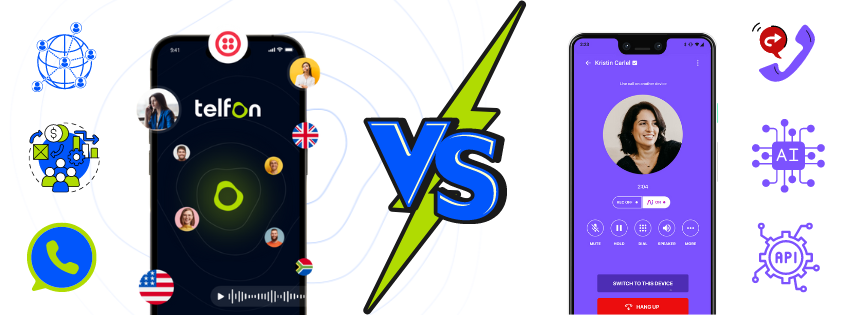
Comparing Telfon and Dialpad directly reveals key differences that can influence your decision. Both are robust platforms, but they target slightly different needs and budgets. Understanding these distinctions is crucial when selecting your next business communication system.
| Feature | Telfon | Dialpad |
|---|---|---|
| Pricing | Highly Affordable (e.g., ~$5/month basic) | Mid-Range to High (Starts ~$15 user/month) |
| Pricing Model | Pay-as-you-go / Subscription | Per-user Monthly Subscription |
| International | Calls/SMS to 180+ Countries | Available |
| WhatsApp Integration | Yes (Multi-Account Support) | No |
| Multi-Number Support | Yes (Across Countries Simultaneously) | Limited/Different Approach |
| Customization | High (Especially on Business Plans) | Medium |
| CRM Integrations | Salesforce, HubSpot (and more) | Salesforce, Slack, G Suite (and more) |
| Target Audience | Individuals & Businesses (SMB focus) | Businesses (SMB to Enterprise) |
Key Differences Explained:
- Pricing Structure: Telfon typically offers significantly lower entry costs and flexible pay-as-you-go options, making it very accessible for individuals and small businesses watching their budget closely. Dialpad uses a standard per-user monthly pricing model, which can become more expensive as your team grows.
- WhatsApp Integration: A notable advantage for Telfon is its built-in WhatsApp integration, including support for multiple accounts. This feature is absent in Dialpad and is a significant benefit for businesses relying on WhatsApp for customer or client communication.
- Customization and Features: While Dialpad offers standard business features, Telfon provides deeper customization, particularly within its business plans. Features like custom messaging services, advanced user analytics dashboards, and granular management tools cater to businesses with specific workflow needs. Telfon’s multi-number support across countries also offers flexibility.
In summary, if your primary concerns are affordability, extensive international calling needs, WhatsApp integration, and high customization for specific workflows, Telfon presents a strong case. Dialpad is a solid all-around platform, particularly for businesses needing tight integration with common office suites and standard unified communication features.
Choosing the Right Alternative for Your Business
Selecting the best business communication system is a critical decision. It goes beyond just picking a platform; it’s about choosing a tool that will empower your team, enhance customer interactions, and support your growth. Here’s a simple approach to help you decide:
- Assess Your Core Needs: What features are non-negotiable? Do you make a lot of international calls? Need shared numbers? Rely heavily on video conferencing? List your must-have features first.
- Evaluate Your Budget: How much can you realistically spend per user or per month? Look closely at pricing models and potential hidden costs as you scale.
- Consider Integrations: Which other software does your business rely on daily (CRM, helpdesk, calendar, etc.)? Ensure the VoIP system integrates seamlessly with these tools.
- Think About Scalability: How many users do you have now, and how many do you anticipate having in the next 1-3 years? Will the platform easily grow with you?
- Test the User Experience: Sign up for free trials or request demos. Is the interface intuitive? Is it easy for your team to learn and use?
- Review Customer Support: What kind of support is offered (phone, email, chat)? Read reviews about their responsiveness and helpfulness.
By carefully considering these factors and comparing them against the features and pricing of the alternatives discussed, you can make an informed choice that best suits your business requirements today and in the future.
Frequently Asked Questions (FAQs)
Here are some common questions businesses ask when looking for a Dialpad alternative or exploring VoIP systems in general.
Q1: What is VoIP and how does it benefit businesses?
A: VoIP stands for Voice over Internet Protocol. It allows you to make and receive phone calls using an internet connection instead of traditional phone lines. Benefits include lower costs, greater flexibility (using phones anywhere with internet), scalability, and access to advanced features like call recording, voicemail-to-email, and integration with other business software.
Q2: How much do business VoIP systems cost?
A: The cost varies significantly based on the provider, the features included, and the number of users. Many providers offer tiered pricing, starting from around $10-$20 per user per month for basic plans and going up for more advanced features or larger teams. Some, like Telfon, offer more affordable entry points or pay-as-you-go options.
Q3: Are Dialpad alternatives reliable?
A: Yes, the alternatives listed, such as RingCentral, CallHippo, OpenPhone, Zoom Phone, and Telfon, are all reputable and reliable platforms used by thousands of businesses. Reliability often depends on your internet connection quality and the provider’s infrastructure.
Q4: Can I keep my existing business phone number when switching to a VoIP system?
A: In most cases, yes. This process is called “number porting.” Most VoIP providers facilitate porting your existing business phone number to their service, ensuring continuity for your clients and contacts.
The landscape of business communication tools offers a wealth of options beyond the most popular choices. By exploring reliable Dialpad alternatives like Telfon, RingCentral, CallHippo, OpenPhone, and Zoom Phone, you can find a solution that perfectly fits your unique operational needs, budget, and growth plans. Evaluate features, compare pricing, and consider which platform will best empower your team to communicate effecti



